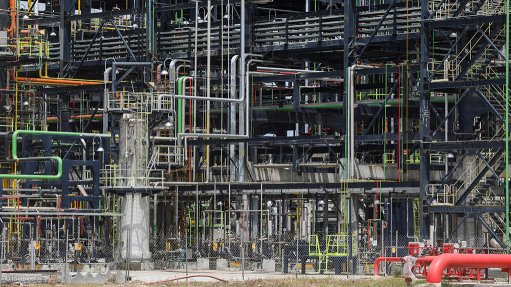GreenCape unveils tool for modelling water efficiency interventions
Nonprofit organisation the GreenCape Sector Development Agency has developed a financial feasibility tool that models scenarios of suitable water efficiency interventions for commercial and industrial buildings, showing that it makes business sense to invest in water efficiency solutions.
With water resilience becoming a critical focus for businesses in a water-scarce economy, GreenCape published its industry brief outlining the business case for investing in water efficiency and alternative water sources for medium-sized offices, medium-sized inorganic manufacturing facilities and large organic manufacturing facilities.
Describing water scarcity as the new normal, the group says that water efficiency programmes can reduce a business’s reliance on municipal water by up to 70% and, in some cases, save 60% in water-related business costs, under either the current strict water restriction tariffs or the relaxed tariffs.
This is particularly relevant in the Western Cape, where Level 6 industrial and commercial restriction tariffs have been introduced amid the most severe drought experienced in decades.
The group highlights that restriction tariffs at Level 1 are R22.78/kℓ for potable water and R20.47/kℓ for water for sanitation purposes, while Level 6 tariffs are R52.61/kℓ for potable water and R44.56/kℓ for water for sanitation purposes.
GreenCape’s tool enables the user to specify the consumption reduction required and the interventions considered and, with several assumptions and calculations, these are then translated into potential savings.
The solutions businesses can explore are selected from a water resilience framework spanning the understanding of water uses and risks, the reduction of consumption, reusing outside water and seeking alternative supply.
“The case studies presented are most encouraging, [and] not only because of the resilience and ability to adapt to the water crisis with relatively small investments and short payback times,” it explains.
A case study for a medium-sized office with 200 people using 5 kℓ/d of water shows that investments of between R14 900 and R166 500 for smart water meters, retrofit taps and toilet units and harvest rainwater could reduce reliance on municipal water use by between 5% and 44%.
The net savings that can be seen under Level 1 restrictions are between R2 250 and R35 300 a year, while on Level 6 restrictions, the offices can save between R8 000 and R84 400 a year.
A large food and beverage manufacturing company using 1 000 kℓ/d can leverage metering, organic effluent reuse and groundwater production to reduce the reliance on the municipal supply of water by 5% to 20%, saving millions of rands every year.
A medium-sized textile company using 200 kℓ/d of water can use smart water metering, inorganic effluent reuse, treated effluent and rainwater harvesting to slash municipal water use by between 5% and 70%.
“These interventions are long-term wins, as these savings remain after the crisis has passed.”
GreenCape highlights interventions that have payback periods of less than a year, such as toilet and tap efficiency fittings and smart metering; however, other short payback interventions, such as staff training and awareness and diverting water for reuse, were not modelled in the case studies.
Longer payback interventions outlined in GreenCape’s model include groundwater production, rainwater harvesting, effluent reuse and upgrading treated municipal effluent to process standards, but did not include seawater desalination, treatment of blackwater for reuse and investment in new production equipment that is more water efficient.
However, the report also points out that a gap remains in the market in terms of catering for small companies, the residential market and the informal economy that do not have the funds available to implement interventions.
“The tariff increases did not coincide with budget cycles, leading many to be strained by the emergency measures and unable to invest,” GreenCape says, adding that, without exemptions or some form of financial assistance, it is more feasible for many companies to simply close down.
“Others have outsourced manufacturing to other provinces, which echoes the economic impact of the drought.”
Comments
Press Office
Announcements
What's On
Subscribe to improve your user experience...
Option 1 (equivalent of R125 a month):
Receive a weekly copy of Creamer Media's Engineering News & Mining Weekly magazine
(print copy for those in South Africa and e-magazine for those outside of South Africa)
Receive daily email newsletters
Access to full search results
Access archive of magazine back copies
Access to Projects in Progress
Access to ONE Research Report of your choice in PDF format
Option 2 (equivalent of R375 a month):
All benefits from Option 1
PLUS
Access to Creamer Media's Research Channel Africa for ALL Research Reports, in PDF format, on various industrial and mining sectors
including Electricity; Water; Energy Transition; Hydrogen; Roads, Rail and Ports; Coal; Gold; Platinum; Battery Metals; etc.
Already a subscriber?
Forgotten your password?
Receive weekly copy of Creamer Media's Engineering News & Mining Weekly magazine (print copy for those in South Africa and e-magazine for those outside of South Africa)
➕
Recieve daily email newsletters
➕
Access to full search results
➕
Access archive of magazine back copies
➕
Access to Projects in Progress
➕
Access to ONE Research Report of your choice in PDF format
RESEARCH CHANNEL AFRICA
R4500 (equivalent of R375 a month)
SUBSCRIBEAll benefits from Option 1
➕
Access to Creamer Media's Research Channel Africa for ALL Research Reports on various industrial and mining sectors, in PDF format, including on:
Electricity
➕
Water
➕
Energy Transition
➕
Hydrogen
➕
Roads, Rail and Ports
➕
Coal
➕
Gold
➕
Platinum
➕
Battery Metals
➕
etc.
Receive all benefits from Option 1 or Option 2 delivered to numerous people at your company
➕
Multiple User names and Passwords for simultaneous log-ins
➕
Intranet integration access to all in your organisation


















